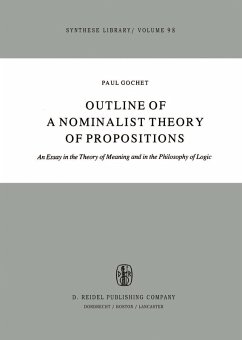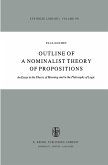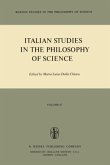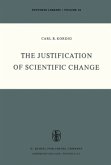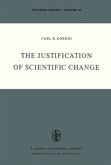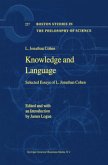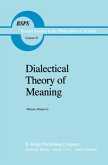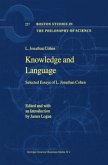Paul Gochet
Outline of a Nominalist Theory of Propositions
An Essay in the Theory of Meaning and in the Philosophy of Logic
Paul Gochet
Outline of a Nominalist Theory of Propositions
An Essay in the Theory of Meaning and in the Philosophy of Logic
- Gebundenes Buch
- Merkliste
- Auf die Merkliste
- Bewerten Bewerten
- Teilen
- Produkt teilen
- Produkterinnerung
- Produkterinnerung
1. IMPORTANCE OF THE SUBJECT In 1900, in A Critical Exposition of the Philosophy of Leihniz, Russell made the following assertion: "That all sound philosophy should begin with an analysis of propositions is a truth too evident, perhaps, to demand a proof". 1 Forty years later, the interest aroused by this notion had not decreased. C. J. Ducasse wrote in the Journal of Philosophy: "There is perhaps no question more basic for the theory of knowledge than that of the nature of 2 propositions and their relations to judgments, sentences, facts and inferences". Today, the great number of…mehr
Andere Kunden interessierten sich auch für
![Outline of a Nominalist Theory of Propositions Outline of a Nominalist Theory of Propositions]() Paul GochetOutline of a Nominalist Theory of Propositions81,99 €
Paul GochetOutline of a Nominalist Theory of Propositions81,99 €![Italian Studies in the Philosophy of Science Italian Studies in the Philosophy of Science]() M.L. Dalla Chiara (Hrsg.)Italian Studies in the Philosophy of Science161,99 €
M.L. Dalla Chiara (Hrsg.)Italian Studies in the Philosophy of Science161,99 €![The Justification of Scientific Change The Justification of Scientific Change]() C. R. KordigThe Justification of Scientific Change81,99 €
C. R. KordigThe Justification of Scientific Change81,99 €![The Justification of Scientific Change The Justification of Scientific Change]() C. R. KordigThe Justification of Scientific Change81,99 €
C. R. KordigThe Justification of Scientific Change81,99 €![Knowledge and Language Knowledge and Language]() L. Jonathan CohenKnowledge and Language121,99 €
L. Jonathan CohenKnowledge and Language121,99 €![Dialectical Theory of Meaning Dialectical Theory of Meaning]() Mihailo MarkovicDialectical Theory of Meaning242,99 €
Mihailo MarkovicDialectical Theory of Meaning242,99 €![Knowledge and Language Knowledge and Language]() L. Jonathan CohenKnowledge and Language112,99 €
L. Jonathan CohenKnowledge and Language112,99 €-
-
-
1. IMPORTANCE OF THE SUBJECT In 1900, in A Critical Exposition of the Philosophy of Leihniz, Russell made the following assertion: "That all sound philosophy should begin with an analysis of propositions is a truth too evident, perhaps, to demand a proof". 1 Forty years later, the interest aroused by this notion had not decreased. C. J. Ducasse wrote in the Journal of Philosophy: "There is perhaps no question more basic for the theory of knowledge than that of the nature of 2 propositions and their relations to judgments, sentences, facts and inferences". Today, the great number of publications on the subject is proof that it is still of interest. One of the problems raised by propositions, the problem of deter mining whether propositions, statements or sentences are the primary bearers of truth and falsity, is even in the eyes of Bar-Hillel, "one of the major items that the future philosophy oflanguage will have to discuss". 3 gave a correct summary of the situation when he wrote in his Ph. Devaux Russell (1967): Since Peano and Schroder who, in fact, adhered more faithfully to Boole's logic of classes, the logical and epistemological status of the proposition together with its analysis have not ceased to be the object of productive philosophical controversies. And especially so since the establishment of contemporary symbolic logic, the foundations 4 of which have been laid out by Russell and Whitehead. _ 2.
Hinweis: Dieser Artikel kann nur an eine deutsche Lieferadresse ausgeliefert werden.
Hinweis: Dieser Artikel kann nur an eine deutsche Lieferadresse ausgeliefert werden.
Produktdetails
- Produktdetails
- Synthese Library 98
- Verlag: Springer / Springer Netherlands
- Artikelnr. des Verlages: 978-90-277-1031-4
- 1980.
- Seitenzahl: 228
- Erscheinungstermin: 31. März 1980
- Englisch
- Abmessung: 241mm x 160mm x 17mm
- Gewicht: 499g
- ISBN-13: 9789027710314
- ISBN-10: 9027710317
- Artikelnr.: 22362159
- Herstellerkennzeichnung Die Herstellerinformationen sind derzeit nicht verfügbar.
- Synthese Library 98
- Verlag: Springer / Springer Netherlands
- Artikelnr. des Verlages: 978-90-277-1031-4
- 1980.
- Seitenzahl: 228
- Erscheinungstermin: 31. März 1980
- Englisch
- Abmessung: 241mm x 160mm x 17mm
- Gewicht: 499g
- ISBN-13: 9789027710314
- ISBN-10: 9027710317
- Artikelnr.: 22362159
- Herstellerkennzeichnung Die Herstellerinformationen sind derzeit nicht verfügbar.
1. Importance of the Subject.- 2. The Roles Played by the Concept of Proposition.- 3. How to Conceive of a Theory of Proposition.- 4. Which Method to Use.- 5. The Merits of Nominalism.- 6. Varieties of Nominalism.- 7. The Senses of the Word 'Proposition'.- I / The Criterion of Ontological Commitment.- 1. Quine's Criterion of Ontological Commitment.- 2. Warnock's Objections to Quine's Criterion of Ontological Commitment.- 3. The Application of the Criterion of Ontological Commitment to Propositions.- 4. Compromising Uses of the Word 'Proposition'.- 5. Critique of Ayer's First Attempt to Escape Ontological Commitments to Propositions.- 6. The Double Interpretation of the Existential Quantifier.- 7. The Double Interpretation of Bound Variables.- 8. From Pragmatics to Ontology.- II / The Syntactic Approach.- 1. Is an Axiomatic Definition of Proposition Possible?.- 2. Two Nominalist Solutions on the Problem of Interpreting Propositional Variables.- 3. What Quine's Notation Reveals With Regard to the Status of Propositions.- 4. Does the Definition of Logical Truth Presuppose the Concept of Proposition? Strawson's Thesis.- 5. Replies to Strawson's Objections.- 6. The Definition of Proposition in Terms of the Premises and Conclusion of an Inference.- III / A Semantic Definition of Proposition in Terms of Truth and Falsity.- 1. The Aristotelian Definition of Proposition in Terms of Truth.- 2. The Influence of the Semantic Definition of Truth on the Concept of Proposition.- 3. Use of the Distinction Between Sentence and Statement as a Solution to the Paradox of the Liar in Natural Language.- 4. The Ontological Status of the Distinction between Statements and Sentences.- 5. Truth and Falsity Apply to Sentences Before Applying to Statements.- 6. The SemanticTheory of Truth and the Correspondence Between Language and Reality.- IV / The Pragmatic Definition of Proposition in Terms of Assertion or Assertability.- 1. The Pragmatic Definition of Proposition in Terms of Assertability.- 2. The Distinction Between Proposition and Statement from a Pragmatic Perspective.- 3. Austin's Distinction Between Locutionary and Illocutionary Acts.- 4. An Examination of Searle's Notion of Proposition.- 5. Stenius' Analysis.- 6. The Performative Hypothesis.- 7. Hausser's Treatment of Moods.- 8. A Vindication of Searle's Position.- 9. A New Account of Searle's Concept of Propositional Content.- V / The Nature of Facts.- 1. The Nature and Status of Facts in Russell's 'Philosophy of Logical Atomism'.- 2. The Merits of Russell's Notion of Fact.- 3. The Defects of Russell's Theory of Facts.- 4. Wittgenstein's Conception of Fact.- 5. Arguments For and Against the Ontological Interpretation of Facts.- 6. Application of Methods of Generative Grammar to Detect the Ontological Nature of Facts.- 7. Why There Cannot be Facts.- VI / The Proposition in Terms of Belief.- 1. Belief and Proposition.- 2. The Problem of False Beliefs.- 3. The Distinction Between Propositional Verbs and Cognitive Verbs.- 4. The Logical Syntax of Propositional Verbs.- 5. An Attempt at Absorbing Propositions into Sentences.- 6. Searle's Views on Intentionality.- VII / Propositions as Meanings of Sentences.- 1. The Relational Conception of Meaning.- 2. The Eternality and Temporality of Meaning.- 3. The Behaviouristic Analysis of the Meaning of Sentences.- 4. The Chess-Theory of Meaning.- 5. An Attempt at Dissolving the Problem Raised by the Meaning of Sentences.- 6. The Picture Theory of Meaning.- 7. The Limitations of the Picture Theory of Meaning.- 8.Beyond the Picture Theory.- 9. The Recursive Definition of Truth as a Tool for Compositional Semantics.- 10. Recursive Semantics and Nominalism.- 11. Categorial Grammar, Set Theoretic Semantics and Nominalism.- 12. Game-Theoretical Semantics.- VIII / An Attempt at a New Solution for the Enigma of the Meaning of False Sentences.- 1. Conditions of Adequacy on a Satisfactory Answer.- 2. Ryle's Solution to the Enigma of the Meaning of False Sentences.- 3. The Possibility of Falsity as a By-Product of the Creativity of Language.- 4. The Solution Offered by Possible Worlds Semantics to the Enigma of the Meaning of False Sentences.- 5. A Pragmatic Solution of the Enigma.- 6. Nominalism Again.- IX / The Identification Criterion of Propositions.- 1. The Importance of Finding a Criterion of Propositional Identity.- 2. The Definition of Proposition in Terms of Synonymy.- 3. Intensional Isomorphism.- 4. The Role of the Notion of Isomorphism in Defining a Criterion for the Identity of Propositions.- 5. Preliminaries to the Application of the Criterion of Extensional Isomorphism.- 6. Some Final Refinements of the Notion of Extensional Isomorphism.- 7. Vanderveken's Criterion.- 8. Suppes' Gradualism.- 9. Indeterminacy of Translation.- X / Propositions and Indirect Discourse.- 1. The Notion of Proposition and of Indirect Discourse.- 2. The Syntactic Approach to the Problem of Intensional Contexts.- 3. Prior's Nominalist Syntax.- 4. L.J. Cohen's Extensionalist Syntax.- 5. Frege's Dualist Semantics and Epistemic Logic.- 6. Carnap's Dualist Semantics.- 7. Quine's Unitary Extensionalism.- 8. Criticisms Addressed to Quine's Nominalist Theory: Kaplan's Alternative Solution.- 9. Hintikka's Pluralistic Extensionalism.- 10. The Pragmatic Approach to the Problem ofIntensional Contexts: Natural Pragmatics.- 11. The Pragmatic Approach to the Problem of Intensional Contexts: Formal Pragmatics.- 12. Objections Against Montague's Semantics.- Conclusion.- Name Index.
1. Importance of the Subject.- 2. The Roles Played by the Concept of Proposition.- 3. How to Conceive of a Theory of Proposition.- 4. Which Method to Use.- 5. The Merits of Nominalism.- 6. Varieties of Nominalism.- 7. The Senses of the Word 'Proposition'.- I / The Criterion of Ontological Commitment.- 1. Quine's Criterion of Ontological Commitment.- 2. Warnock's Objections to Quine's Criterion of Ontological Commitment.- 3. The Application of the Criterion of Ontological Commitment to Propositions.- 4. Compromising Uses of the Word 'Proposition'.- 5. Critique of Ayer's First Attempt to Escape Ontological Commitments to Propositions.- 6. The Double Interpretation of the Existential Quantifier.- 7. The Double Interpretation of Bound Variables.- 8. From Pragmatics to Ontology.- II / The Syntactic Approach.- 1. Is an Axiomatic Definition of Proposition Possible?.- 2. Two Nominalist Solutions on the Problem of Interpreting Propositional Variables.- 3. What Quine's Notation Reveals With Regard to the Status of Propositions.- 4. Does the Definition of Logical Truth Presuppose the Concept of Proposition? Strawson's Thesis.- 5. Replies to Strawson's Objections.- 6. The Definition of Proposition in Terms of the Premises and Conclusion of an Inference.- III / A Semantic Definition of Proposition in Terms of Truth and Falsity.- 1. The Aristotelian Definition of Proposition in Terms of Truth.- 2. The Influence of the Semantic Definition of Truth on the Concept of Proposition.- 3. Use of the Distinction Between Sentence and Statement as a Solution to the Paradox of the Liar in Natural Language.- 4. The Ontological Status of the Distinction between Statements and Sentences.- 5. Truth and Falsity Apply to Sentences Before Applying to Statements.- 6. The SemanticTheory of Truth and the Correspondence Between Language and Reality.- IV / The Pragmatic Definition of Proposition in Terms of Assertion or Assertability.- 1. The Pragmatic Definition of Proposition in Terms of Assertability.- 2. The Distinction Between Proposition and Statement from a Pragmatic Perspective.- 3. Austin's Distinction Between Locutionary and Illocutionary Acts.- 4. An Examination of Searle's Notion of Proposition.- 5. Stenius' Analysis.- 6. The Performative Hypothesis.- 7. Hausser's Treatment of Moods.- 8. A Vindication of Searle's Position.- 9. A New Account of Searle's Concept of Propositional Content.- V / The Nature of Facts.- 1. The Nature and Status of Facts in Russell's 'Philosophy of Logical Atomism'.- 2. The Merits of Russell's Notion of Fact.- 3. The Defects of Russell's Theory of Facts.- 4. Wittgenstein's Conception of Fact.- 5. Arguments For and Against the Ontological Interpretation of Facts.- 6. Application of Methods of Generative Grammar to Detect the Ontological Nature of Facts.- 7. Why There Cannot be Facts.- VI / The Proposition in Terms of Belief.- 1. Belief and Proposition.- 2. The Problem of False Beliefs.- 3. The Distinction Between Propositional Verbs and Cognitive Verbs.- 4. The Logical Syntax of Propositional Verbs.- 5. An Attempt at Absorbing Propositions into Sentences.- 6. Searle's Views on Intentionality.- VII / Propositions as Meanings of Sentences.- 1. The Relational Conception of Meaning.- 2. The Eternality and Temporality of Meaning.- 3. The Behaviouristic Analysis of the Meaning of Sentences.- 4. The Chess-Theory of Meaning.- 5. An Attempt at Dissolving the Problem Raised by the Meaning of Sentences.- 6. The Picture Theory of Meaning.- 7. The Limitations of the Picture Theory of Meaning.- 8.Beyond the Picture Theory.- 9. The Recursive Definition of Truth as a Tool for Compositional Semantics.- 10. Recursive Semantics and Nominalism.- 11. Categorial Grammar, Set Theoretic Semantics and Nominalism.- 12. Game-Theoretical Semantics.- VIII / An Attempt at a New Solution for the Enigma of the Meaning of False Sentences.- 1. Conditions of Adequacy on a Satisfactory Answer.- 2. Ryle's Solution to the Enigma of the Meaning of False Sentences.- 3. The Possibility of Falsity as a By-Product of the Creativity of Language.- 4. The Solution Offered by Possible Worlds Semantics to the Enigma of the Meaning of False Sentences.- 5. A Pragmatic Solution of the Enigma.- 6. Nominalism Again.- IX / The Identification Criterion of Propositions.- 1. The Importance of Finding a Criterion of Propositional Identity.- 2. The Definition of Proposition in Terms of Synonymy.- 3. Intensional Isomorphism.- 4. The Role of the Notion of Isomorphism in Defining a Criterion for the Identity of Propositions.- 5. Preliminaries to the Application of the Criterion of Extensional Isomorphism.- 6. Some Final Refinements of the Notion of Extensional Isomorphism.- 7. Vanderveken's Criterion.- 8. Suppes' Gradualism.- 9. Indeterminacy of Translation.- X / Propositions and Indirect Discourse.- 1. The Notion of Proposition and of Indirect Discourse.- 2. The Syntactic Approach to the Problem of Intensional Contexts.- 3. Prior's Nominalist Syntax.- 4. L.J. Cohen's Extensionalist Syntax.- 5. Frege's Dualist Semantics and Epistemic Logic.- 6. Carnap's Dualist Semantics.- 7. Quine's Unitary Extensionalism.- 8. Criticisms Addressed to Quine's Nominalist Theory: Kaplan's Alternative Solution.- 9. Hintikka's Pluralistic Extensionalism.- 10. The Pragmatic Approach to the Problem ofIntensional Contexts: Natural Pragmatics.- 11. The Pragmatic Approach to the Problem of Intensional Contexts: Formal Pragmatics.- 12. Objections Against Montague's Semantics.- Conclusion.- Name Index.

